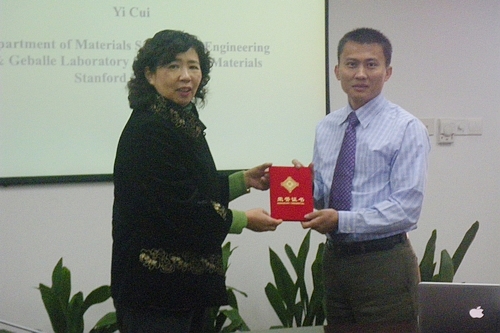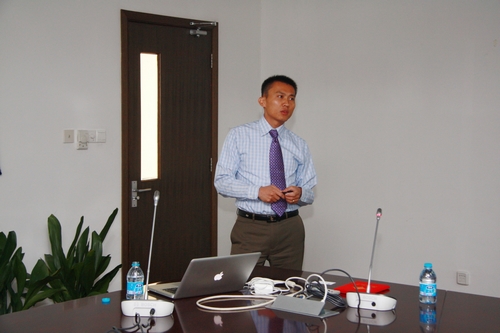Invited by director Hui Yang, Dr. Yi Cui, an associate professor of department of materials science and engineering at Stanford University, who is now well-known in the areas of nanoscale science and technology, came to visit our institute on January 13, 2011. During his visit, he gave us a fantastic talk on “Nanoscience-Enabled Energy and Environment Technologies”, reviewing the progress made by his group in the past four years. Though very young, Dr. Yi Cui is now leading a 35-person group and has published many top-journal papers. Due to his creative achievements in using Si nanowires as novel cathode material for high-power lithium battery, application of nanotubes and nanowires in photovoltaic devices, energy storage, water purification nanopaper and nanotextile technologies etc., he has raised sufficient research fundings from government and industries. The young scientists of our institute had a good discussion with him after his talk on some hot issues in the field of energy and environment. Vice director Peihua Liu and Liwei Chen attended the seminar and on behalf of the institute, director Liu issued a certificate to Dr. Yi Cui, awarding him as our honored guest scientist.
Prof. Yi Cui graduated from the University of Science and Technology of China in 1998, and joined the graduate school at Harvard University, where he pursued his PhD degree under the supervision of Professor Charles M. Lieber from 1998 to 2002. He then did his two-year postdoc. research on electronics and colloidal nanocrystals at University of California, Berkeley. He Joined Stanford University four years ago, now is a tenured associated professor. His current research is focused on nanomaterials’ synthesis, electronic properties, solar cells, battery, memory and sensor devices. Dr. Yi is very creative and productive not only in fundamental research but also in technology transfer and industrialization. He had a lab tour in our institute and was impressed by the development of research platforms. He expressed that he would have more collaboration with our researchers in future and develop some academic programs during our phase-two construction.


downloadFile
